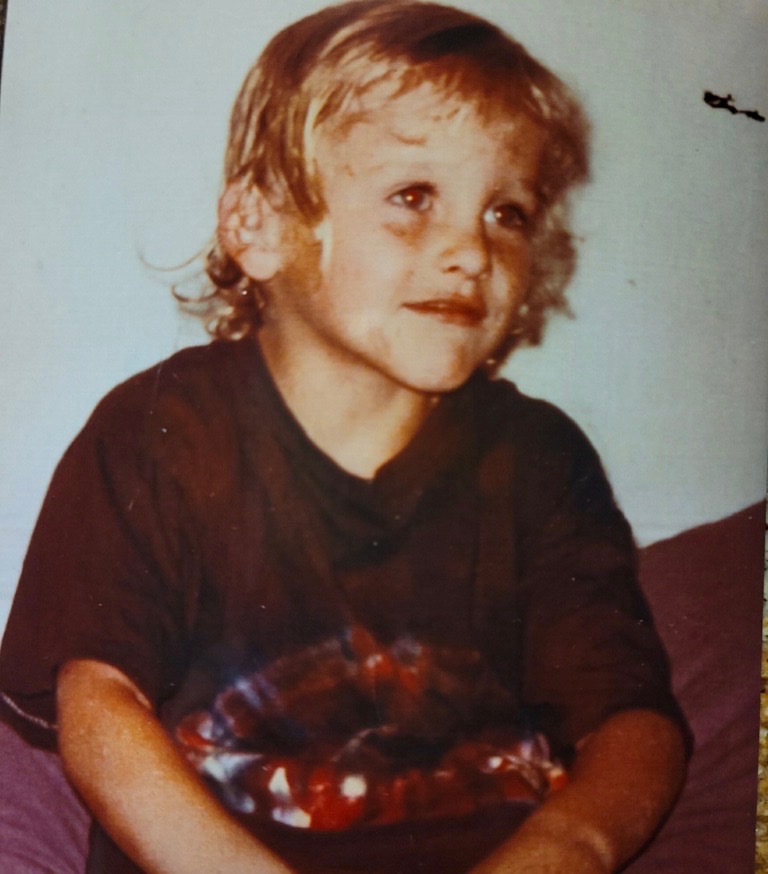Daisy Switzer has spent 21 years knowing how much suffering can be unleashed by failures in the legal and behavioral health systems: She internalized that tragedy throughout her body after becoming one of the miracle survivors of a rampage shooting that happened on a rainy January morning in Nevada County. Scott Thorpe, an unwell man who’d sought help at Daisy’s clinic while frightening his own girlfriend and family members, suddenly snapped to the point of walking in with a semi-automatic pistol. As health workers and caregivers were being shot outside Daisy’s office – falling in a thunderous cacophony of explosions and screams – the young mother had only one chance to see her daughter again.
Daisy knows the anguish born from systemic breakdowns because to escape being murdered meant jumping out a two-and-a-half-story window, colliding with cold, freezing concrete below. She broke 39 bones throughout her body. Spiral breaks. Ankle breaks. Rib breaks. A shattered tailbone. A tibia turned to mulch. Daisy spent 10 full months lying on her back as she tried to mend. It was a long stretch of absorbing what had happened, the five people who’d been shot, the three who’d been slain, including a 19-year-old coworker.
Daisy eventually pushed ahead with developing her career as a forensic psychologist. She’s done her part over years helping judges and probation officers with mental health evaluations across the region. But last fall, deficiencies in the legal and behavioral health systems of her home county – Nevada County – came back to scorch her life like a lightning bolt. Again. What happened was a slow-burn saga proving to Daisy that when it comes to the same courts that failed to confiscate Scott Thorpe’s gun once he was deranged, and the same outreach apparatus for treatment that couldn’t steer him from a path to horror, not nearly enough has changed in the two decades since she jumped out that window.
Those failures appear to have played a role in costing Daisy her brother, 50-year-old Paul Switzer.
Paul was one of the estimated 1.24 million Californians trying to cope with serious mental illness. In the months preceding his death, he was also one of the estimated 40,250 Californians dealing with a mental health disorder while being homeless. Paul was diagnosed Biopolar I with psychotic features, a condition he had lived with for most of his life. For those close him, Paul was a maddeningly divided person, capable of grand gestures of protectiveness and support, but also consumed by manic, unfocused behavior – and drawn to moments of reckless chaos.
Even when Paul was doing well on his medications, it was hard for his family members to keep him stabilized and in housing.
“Paul wasn’t on the streets because he wasn’t loved,” Daisy stressed.
In late September 2021, Paul was hospitalized after being beaten with a baseball bat in a far-flung backwater of the mountains. A couple of days after he was moved out of an ICU trauma center in Roseville to a nursing care facility in Auburn, Paul had a near-fatal medical event and was again rushed to the emergency room, this time at Sutter Auburn Faith Hospital. That’s where Paul Switzer’s interactions with the system become murky – and perplexing.
Being treated for a fractured skull, a broken femur, cracked ribs, a snapped wrist and a near-fatal medical event, Paul was suddenly taken away from care by Nevada County sheriff’s deputies, who arrested him on five-month-old charges that mainly involved him making annoying phone calls, as well as other actions attributable to his mental illness. Sheriff’s officials later told SN&R that the warrants were issued by the Nevada County District Attorney’s Office, and that Paul was officially “released” by hospital staff when they cuffed him. Paul’s family, on the other hand, say he was essentially body-snatched from his hospital bed and thrown into cold jail cell while still in his paper gown.
What followed were eight days of Paul’s loved ones trying to get him out of jail and back to proper physical-and-mental health care.
Those were the last eight days of Paul Switzer’s life.
And in the absolute worst turn of events, Paul’s lifeless body was discovered in an Auburn motel room by his own mother.
“It can be hard not to lose faith when you see all the breakdowns in the system,” Daisy admitted. “You have to look for those little moments that remind you why you do this work.”
‘The Outlaw Paul Switzer’

What can a mother say?
“My son had a shit life,” Jayne Nordstrom managed a week after her son’s death, gazing at a grey thicket of oak woodlands in the early fall light.
Having lived in Nevada County for 24 years, Nordstrom is a prime example of how mental illness can devastate any family’s tranquility for years on end. She spent decades as a high-profile attorney for the musical icons of San Francisco, handling civil proceedings for the likes of Melvin Belli and Vince Welnick, and often getting mentioned as the city’s best attorney by The Chronicle’s titan of society life, Herb Caen.
But even with all that success, Nordstrom couldn’t shield her son from becoming a troubled soul. Paul was struck by spinal meningitis as an infant, trapped in a tiny body fighting an infection that kills 10 percent of babies and leaves up to 50 percent with long-term complications. Paul pulled through, only to have another harrowing moment before he was in the second grade. In the fall of 1973, when Paul was 6, he was playing at a neighbor’s house when he free-fell off the side of a banister. He dropped 5 feet down to crack his skull on cement. Nordstrom says he was in a coma for a week. To this day, she wonders if the meningitis, or the catastrophic head injury – or some combination of them – played a role in the mental health challenges that would plague the rest of Paul’s life.
But the first signs that Paul was different started before that, at least in Daisy’s memory. He was a natural rule-breaker who didn’t always understand basic social norms. Daisy’s most vivid flashbacks of Paul’s hyperactive childhood involve his compulsion to challenge those he perceived as bullies, even if the antagonist had considerable height and reach on him.
“He was legendary for risk-taking,” Daisy recalled. “And there was this side of Paul where he was like Jessie James – so, not a hero, definitely a criminal – but he would go up to the biggest, baddest person who was hassling other people and take them on. He had this idea that, ‘I’ll fight for the people I love, even when it’s not very smart to be doing that.’ There was part of Paul who was really a champion – really a little love.”
By the time Paul was in high school, he was taking steroids and inexplicably obsessed with physical fitness. In the coming years, more tell-tale signs of Paul’s Bipolar I would emerge. He had off-the-wall eating disorders. He would go days without sleeping, even though he wasn’t on stimulants. He had disorganized speech at times. In other moments he experienced delusions and auditory hallucinations. For family members, helping Paul salvage a normal life became daunting. He took their vehicles without asking. Fixated by technical tinkering, Paul had set almost every family member’s house on fire while trying to re-wire electrical systems that weren’t broken. He would also channel his unchecked energy into performing renovations on rundown, abandoned structures he didn’t have permission to touch, sometimes stoking the ire of nearby neighbors by running a chainsaw at 3 in the morning.
And like many people dealing with mental illness, Paul had run-ins with the law. Daisy has alluded to him making the front page of a local newspaper for “a highspeed naked chase.”
But she also notes that, for all of Paul’s flair for drama, he remained a protective brother, like the time she was getting out of a bad relationship and Paul made it clear to the guy he had to go.
Other examples just make Daisy chuckle.
“One time, there was a prowler in Grass Valley where I lived at the time, and Paul decided he was going to put on camouflage and get some night vision goggles – who knows where he got them – and sit on my roof and keep an eye out. And all I could think was, ‘Dear God, let the police find this guy before my brother does.’ … There was a caretaking side of him that could be incredibly cool. I think he wanted a good world, but his executions were flawed.”
Later, in the aftermath of Paul’s death, Daisy tried penning a no holds barred obituary about her brother. She titled it “The Outlaw Paul Switzer.” The piece, which was never published, chronicled some of his most outlandish antics, but ended with the reflection, “Yet he had a sense of justice … He wanted to help. Something was missing, but it was not usually his heart.”
Man down in the woods

By the summer of 2021, Paul had been invited to move onto a remote property with the skeleton of a half-finished house on it in North San Juan, which many consider the most isolated and crime-riddle territory in western Nevada County. Living with two other men, Paul was supposed to help clean up a hellacious mess that squatters had left ahead of them. He’d occasionally drop by to visit his mother, who lives in a rolling section of countryside between Grass Valley and Nevada City. Paul would say ‘hi,’ sometimes do chores around his mom’s yard, sometimes engage in friendly conversation with the neighbors. But he never stayed long. His manic unpredictability didn’t make for an entirely comfortable relationship with Nordstrom’s husband, John.
“He was either the sweetest person on earth, or pretty obnoxious – I get that,” Nordstrom acknowledged of Paul.
Not long before going on vacation, Nordstrom drove up to visit Paul in North San Juan. She noticed that he was taking care of some chickens on the land. One thing that everyone knew about Paul Switzer was that he loved animals.
“He seemed to be in his element,” his mother said in quiet reflection. “He was kind of happy.”
Then came the fight. According to several witnesses who were there, Paul had become extremely erratic, rummaging through other peoples’ stuff on the property and changing the locks on other peoples’ belongings. He reportedly broke the windows and headlights out of an RV that was parked at the address. When the others living there asked him to leave, they say he became confrontational and unpredictable. The person who owned the chickens and RV, Ted (not his real name) had asked Nevada County sheriff’s deputies to do a civil standby as the group tried to get Paul to leave.
What happened next, by Ted’s account to SN&R, is that before deputies arrived, Paul brandished a B.B. gun that he’d wrapped with a jacket to look like a real rifle. A struggle ensued. Ted began hitting Paul with a baseball bat to get him to drop the weapon. Ted says Paul kept lunging at him, forcing him to take more swings. At one point, Paul finally collapsed. Ted says that Paul then somehow picked himself up and charged through a dense wall of chaparral, which caused him to fall hard down a hillside.
Paul didn’t move after that.
Nordstrom has had a long conversation with Ted about what happened and believes his version of events. Ted’s name is being withheld because, while he was initially arrested for assaulting Paul, prosecutors eventually dropped the charges, partly at Nordstrom’s request.
“We were on the phone with dispatch as soon as he went down,” Ted recalled this week. “We were cooperative with the sheriffs the whole time – we were out there with them for like eight hours after it happened.”
With his body totally broken, Paul was rushed to the trauma center at Sutter Roseville Hospital. He was stabilized; yet by the time Nordstrom received news from Paul’s friends of what had happened, a bizarre chain of events had already begun, one that would raise questions for his family about whether Nevada County law enforcement and prosecutors operated with any common sense, any notion of compassion, or acknowledgement of the spirit of the law.
Taken

Paul was moved to Westview Healthcare Center, a skilled nursing facility in Auburn. Nordstrom was constantly checking on him as he began to recover there. Then one day she showed up to learn Paul had been found unresponsive in his room. He was rushed to Sutter Faith Auburn Hospital on fears he’d somehow had a fentanyl overdose. There was also the possibility he’d tried to commit suicide with some kind of substance in his possession. Nordstrom was desperately trying to get answers.
Paul was stabilized by doctors at the hospital. Nordstrom resumed her daily visits, this time to Sutter Faith. She knew her son was on some kind of medical watch. A few days into checking on him, the nurses suddenly wouldn’t let her in to see him.
“They said, ‘All we can tell you is that he’s here; but we can’t give you any further information,’” Nordstrom recalled. “And I said, ‘Bull shit, I’m his mother – and I’m a lawyer.’ In terms of giving an excuse why this was happening? They didn’t.”
Then, on September 23 at 11:55 a.m., as Nordstrom was at home figuring out her options, Nevada County sheriff’s deputies arrived at the hospital to arrest Paul on separate four and five-month-old arrest warrants. According to the department’s communications manager Andrew Trygg, the warrants had been issued by the office of Nevada County District Attorney Jesse Wilson. Court records confirm that Wilson’s prosecutors hit Paul with four counts of making annoying phone calls, all of which they opted to charge as felonies. The warrants also carried one charge of making a criminal threat and one misdemeanor allegation of violating person’s civil rights. In the sole hearing on this case, prosecutors didn’t elaborate on what they believed Paul actually did around the charges they filed, though records indicate he did have a history of violence.
Despite Paul’s broken bones, bruised organs and his inability to walk on his own two feet – and despite having just lived through a near-fatal medical event – the deputies took him away from further care at the hospital or further care at the skilled nursing facility. Instead, they booked him into the Auburn jail to await a court hearing in Nevada County the next morning.
“Mind you, he’s terribly injured,” Nordstrom explained. “The next thing I know, I’m getting a phone call from him in the jail. He could barely talk. He said, ‘Mom, I’m freezing, I’m miserable.’ I told him, ‘I’ll deal with it.’ I was in San Francisco when he called. I drove straight home, renewed my law license online.”
During the flurry of activity, Nordstrom called her own personal neurologist to ask about taking someone with Paul’s injuries away from medical treatment options and thrusting them into a jail setting. She says her doctor expressed serious misgivings.
Trygg says his department’s position is that Paul was officially released by the hospital. In an effort to determine whether Sutter’s doctors had discharged Paul from care when the deputies arrested him, SN&R spoke with Sutter Health communications specialist Liz Madison, who said the hospital couldn’t confirm whether Paul was discharged because of patient privacy laws.
Transcripts from Paul’s arraignment in Nevada County Superior Court the next morning paint a picture of Nordstrom and Judge B. Scott Thomsen trying to make sense of what was happening. They, along with Deputy District Attorney Colin Child and Deputy Public Defender Matthew Kellegrew met in Department 2 of Nevada City’s old Art Deco courthouse.
Paul appeared by video link from the Auburn jail.
When Judge Thomsen introduced Paul to his public defender, the defendant spoke up. “I did want to have my mother represent me, your honor,” he said.
Nordstrom advised Thomsen to keep the public defender involved while she tried to get her legal bearings. “Simply because my expertise is not criminal law,” she remarked to the judge. “Through I’m going to learn it real quick.”
Thomsen agreed, turning to the video monitor. “She’s going to come up more to speed, shall we say,” he told Paul, “but right now the public defender is going to represent you, okay?”
“Okay,” Paul replied.
Kellegrew immediately started advocating for his client, informing the judge of the extent of Paul’s injuries – injuries he’d sustained as the named victim in an official criminal investigation. He requested Paul be granted a pretrial release from jail as soon as possible.
“It’s important to keep him as connected to that treatment as possible,” the public defender pointed out.
Paul’s attorney also mentioned another important factor for Thomsen to consider.
“I want to note that the allegations in the complaint are alleged to have occurred in May and June,” Kellegrew went on. “Here in September, what Mr. Switzer has indicated is that – in between a moment where there may have been disruptions to his medication and psychiatric treatment, he has since resumed taking those medications and that psychiatric treatment. I would note that there are no subsequent allegations beyond those dates and today’s date.”
But Paul’s better prospects while being on mood stabilizers and anti-psychotics didn’t stop the prosecutor from opposing his release, nor did Paul’s extreme physical deterioration.
“The defendant has one failure to appear in the last two years,” the deputy district attorney argued.
That’s when Nordstrom spoke up.
“He has a lung problem, which I can hear on the video,” she said to Thomsen. “I believe he had pneumonia in the hospital and some kind of chemical pneumonia from his injuries. So, jail is not a very good place for him right now.”
Alluding to the fact that rural county judges often get familiar with residents who suffer from mental illness, Thomsen started signing Paul’s release order over the prosecutor’s objections.
“Mr. Switzer appears to be doing better now,” the judge mentioned. “Mr. Switzer is – I’ll say it – known to the Court. He appears to be much more composed right now. He appears to be much more stable right now. He appears to be thinking, listening and understanding … I want to maintain what I think has been started, whether in the hospital or otherwise.”
A walker, a hotel room and an ending

When Nordstrom picked Paul up from the Auburn Jail, she knew he wasn’t doing well. She says her son could barely stand and had to use a walker just to lurch out of the intake facility. According to Nordstrom, as she and Paul made their way to the door, a Placer correctional officer refused to let them use the walker in the parking lot.
“He said, ‘You can’t take that, it belongs to us,’” Nordstrom remembered.
Paul’s mother, who’s 73 and has her own back injury, was forced to grapple with a man who was dead on his feet as she labored to get him to get him outside.
“My son is 5-foot-11, and I could barely make it to my car,” she said. “And when I got him in to the car, I didn’t want him to see me cry. It was like, “What do I do with him?’”
Later, after Paul was gone, Nordstrom sent a letter to the warden of the Auburn Jail, informing him she was donating a walker.
“Paul was severely incapacitated, yet your officer instructed him to ‘walk to my car,’ as the walker ‘belonged to the jail,’” she wrote. “Feel free to donate the walker to anyone needing it. I cannot fathom the rationality for withholding this from someone who clearly needed it. I hope this never happens to anyone again.”
Nordstrom cc’d Gov. Gavin Newsom.
The next step was looking for a place for Paul to stay as his family searched for treatment options. A social worker from Sutter Auburn Faith was trying to find him housing, but nothing had come of it. Nordstrom started renting Paul hotel rooms to recover in. She was worried that he might have a slow internal bleed: He always seemed to be freezing in his room, often turning its thermostat up to the point where his mother could barely stand to be in there.
“I was staying every day with him,” Nordstrom said. “And I’d wait till he fell asleep, and then I’d come home and go back the next morning.”
On Oct. 1, eight days after Paul was released from jail, Nordstrom showed up to find him feeling worse than ever. They watched a movie together inside his hotel room. As someone on the spectrum, Paul wasn’t always physically affectionate; but, on this day, he fell asleep with his head on his mother’s shoulder.
Nordstrom eventually left him in a deep slumber with plans to take him out to breakfast the next morning.
When she arrived that Sunday morning, she found Paul dead in his room.
Nordstrom called 911, managing to stay on her feet as a fire engine, an ambulance and three Placer County sheriff’s deputies showed up. When Nordstrom heard the paramedics officially pronounce her son, she fainted.
Today, Nordstrom stresses that the deputies who arrived that morning were extremely kind to her, showing the compassion and professionalism she had found so lacking at their department’s jail facility. She first spoke with SN&R about Paul’s death a week after it happened. She was still in utter shock.
“No mother should ever see that,” Nordstrom said with a faltering voice, her son being readied for cremation.
Months later, Nordstrom learned that Paul had died of a fatal heroin overdose, one which was almost certainly intentional. He’d actually left a note in the room saying that he was scared of going back to jail. Now, she’s forced to wonder would have happened if Paul had stayed directly connected to medical and mental healthcare, either at Sutter Faith Auburn or the skilled nursing facility, rather than getting pulled prematurely into the court system. Or what would have happened if Nevada County, which had known the extent of Paul’s mental health disorder for years, had put him in an official conservatorship, meaning a forced hospitalization with supervised treatment?
SN&R requested an interview with Nevada County District Attorney Jesse Wilson. In that request, it was made clear that the newspaper wanted to discuss questions of whether – in light of the pandemic’s impact on jails in fall 2021; and in light of the current California crime wave that even Gov. Newsom has acknowledged; in light of well-known jail overcrowding issues, and in light of the intended spirit of the law that district attorneys can glean from voter-approved measures such as Prop. 47 and Prop. 57 – whether Wilson still believed that having a mentally ill and severely incapacitated man arrested at a hospital and disconnected from care over annoying phone calls showed sound judgement? SN&R also asked if Wilson still thought his office could justify its use of public resources in this case?
Wilson did not respond to that interview request.
“What happened to Paul should not have happened,” Nordstrom reflected. “You don’t take someone who’s been in the intensive care unit, and put them in a jail cell over fucking annoying phone calls.”
From Daisy’s perspective, having worked as forensic psychologist with county courts all over California, the story of Paul’s final weeks is utterly unbelievable.
“I don’t think anyone should be treated the way Paul was treated,” Daisy said. “I think anyone with even a modicum of common sense anywhere in that chain of processes would be able to recognize that this is unacceptable by any standard, no matter who he was or what he did.”
She added, “And for me, personally, as his sister, yeah, it’s unforgivable.”


Be the first to comment on "Circling shadows: One family’s dual nightmare in a state with no answer for mental illness"